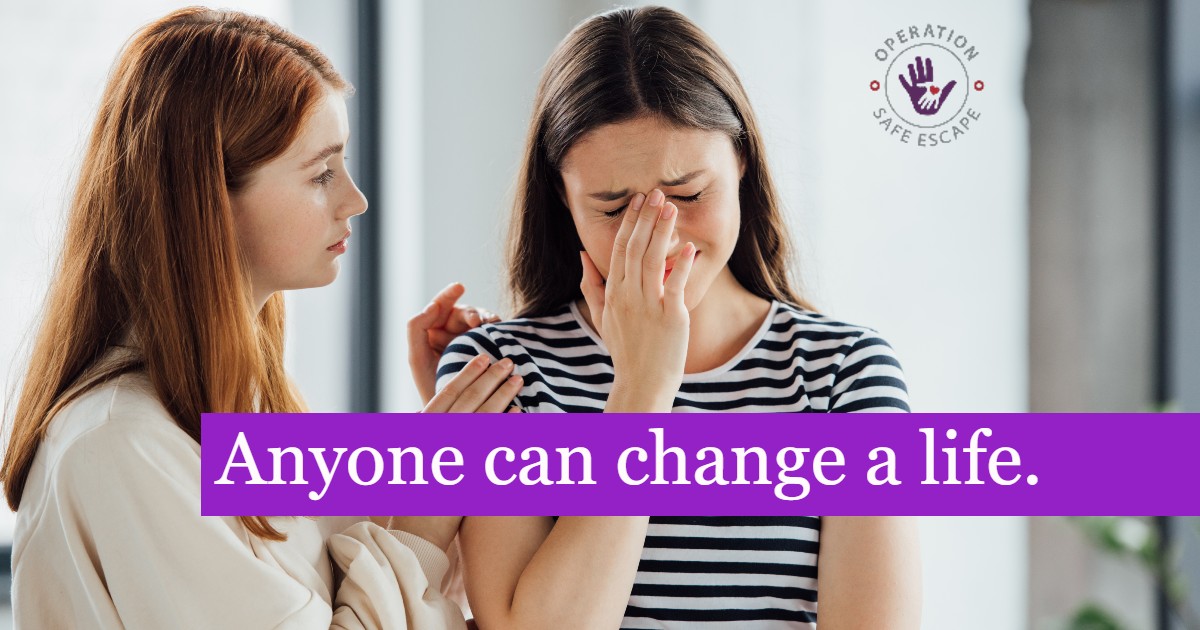Today is the 29th annual “National Be an Angel Day.” This is a day when we not only remember the people that made a difference in our own lives, but also a day where we reflect on the many ways we can help others around us. Someone you know is struggling today; how can you help?
You can make a difference in the life of a survivor. It starts with listening.
How do you recognize domestic violence?
Abusers will generally put on a sort of “mask” in public, reserving the most obvious forms of abuse for in private. This is itself a form of manipulation, so it’s important to recognize the signs of abuse that might not be so obvious:
- Their partner insults them in front of others, or even in public
- They are constantly worried about upsetting their partner or making them angry
- They keep making excuses about their partner’s behavior or minimize their comments
- Their partner appears to be jealous and possessive, or even controls who they’re able to associate with
- The relationship seems to be moving very quickly, and they’re pressured to make commitments early on in the relationship
- You notice unexplained marks or injuries, such as bruises or cuts
- They stop spending time with friends and family, or significantly reducing the time they spend with friends and family without a clear reason
- They seem depressed or anxious, or demonstrate other personality changes
- They have unexplained financial problems, often a symptom of financial abuse
Don’t wait for someone close to you to tell you what’s going on. If you see something concerning, say something!
Teen Dating Violence and Abuse
Teenage relationships can often be more volatile than adult ones. It’s just as important to share information and resources with teens, especially if you have reason to suspect the relationship is abusive in any way. Some signs of abuse include:
- Changes in behavior, such as unexplained moodiness, temper, depression, or withdrawing from friend or family groups
- Pressure to take the relationship “to the next level,” either physically or with long-term commitments
- Showing up unannounced and uninvited
- The relationship is extremely volatile; they’re constantly fighting or breaking up and getting back together. The cycle is often restarted with a grand gesture by the partner, which may include expensive gifts or frequent efforts to contact them
- New signs of body or appearance insecurity
- The partner starts speaking for the teen, especially when discussing plans or opinions
- They’re monitoring the teen’s devices, tracking their location, and otherwise invading their privacy
- They are pressured to respond to text messages or other contact immediately, and become distressed when they’re not able to receive and respond to messages quickly
- Their possessions get vandalized or destroyed by their partner
- Unexplained or hidden injuries
What can I do?
If you know or suspect that someone close to you is in an abusive relationship, taking the next step can be hard and you may even be afraid of offending someone you care about. It’s always okay to share your concerns, and it might even save their life.
- Tell them you’re concerned about their safety, and what specifically worries you. This can help them see that the behaviors aren’t okay and that people care
- Be specific with how you want to help, whether you can offer resources, space, comfort, childcare, or anything else
- Encourage them to talk to someone that can help, such as the National Domestic Violence Hotline, Operation Safe Escape, a local agency, etc
- Encourage them to do things they used to enjoy but may have stopped doing
- Give them your attention. Find a time when you won’t be distracted while talking
- Don’t try to force them to do anything; it can be hard, but they might not be ready or able to make a change at that time. Let them know you’ll be there for them when they are. Also, don’t try to shame or blame them for anything that happened
- Let them know you’ll always be there for them, whether they stay or are ready to leave
Resources:
Make a safety plan. Note: when making a safety plan, which may include storing important documents or clothing, be careful not to give clues to the abuser. If they would notice important documents missing or see a “go bag” hidden in the home, this can escalate the abuser
The National Domestic Violence Hotline. The Hotline offers anonymous chat, text, and other resources
The Coalition Against Stalkerware. Not only does the Coalition do great work in combating stalkerware apps and tools, take a look at the members for even more resources

